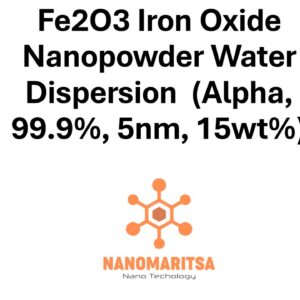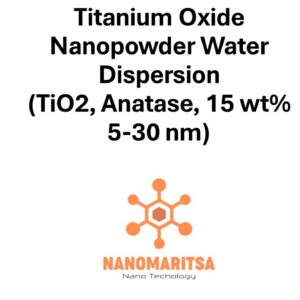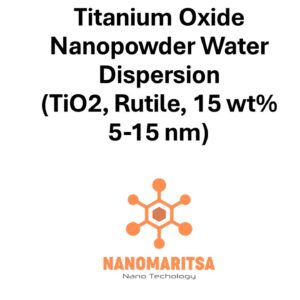Silicon Carbide Nanopowder Water Dispersion (SiC, 99+%, <80nm, 10wt% in Water)
€70.00
CompareSilicon Carbide Nanopowder Water Dispersion (SiC, 99+%, <80 nm, 10 wt% in Water) is a water-based suspension containing high-purity silicon carbide (SiC) nanoparticles. The dispersion has the following key features:
1. Composition:
- Silicon Carbide (SiC):
- Silicon carbide is a compound made of silicon and carbon known for its exceptional hardness, thermal conductivity, electrical conductivity, and chemical stability. It is used in a wide range of applications, including abrasives, electronics, and energy storage.
- Purity (99+%):
- The SiC nanoparticles have a purity of 99+%, meaning that they consist predominantly of silicon carbide, with very few impurities. This high purity ensures superior performance in sensitive applications.
- Particle Size (<80 nm):
- The nanoparticle size is less than 80 nanometers, providing a high surface area for improved reactivity, better dispersion stability, and enhanced performance in various applications.
- Concentration (10 wt% in Water):
- The dispersion contains 10% by weight of silicon carbide nanoparticles suspended in water, providing a balanced concentration that is suitable for a range of industrial and scientific applications.
- Water-Based Dispersion:
- The nanoparticles are dispersed in water, making this formulation easy to handle, environmentally friendly, and suitable for use in water-based systems.
2. Key Properties:
- High Hardness:
- Silicon carbide is one of the hardest known materials, with a Mohs hardness of around 9, making it ideal for use in abrasive and wear-resistant applications.
- Thermal Stability:
- SiC has excellent thermal stability, with the ability to withstand high temperatures without degradation, which makes it useful in high-temperature environments.
- High Purity:
- The 99+% purity of the SiC ensures that the nanoparticles perform optimally without the interference of contaminants.
- High Surface Area:
- With nanoparticles sized <80 nm, the material offers a large surface area, which enhances its reactivity, especially in applications like coatings and composites.
- Electrical Conductivity:
- SiC has good electrical conductivity, making it suitable for semiconductor and electronic applications.
- Chemical Stability:
- Silicon carbide is chemically inert and resistant to corrosion, oxidation, and most acids and bases, making it suitable for harsh environments.
3. Applications:
- Abrasive Materials:
- Due to its extreme hardness, SiC is commonly used in abrasives, cutting tools, and grinding applications.
- Ceramics and Composites:
- SiC nanoparticles are used to strengthen ceramics and composite materials, improving their toughness, wear resistance, and thermal conductivity.
- Semiconductor Industry:
- SiC is used in semiconductors, particularly for high-power and high-frequency applications, due to its excellent thermal conductivity and electrical properties.
- Coatings:
- Wear-Resistant Coatings: SiC nanoparticles are often incorporated into coatings for surfaces that need to resist wear and tear.
- Thermal Barrier Coatings: Used in applications where materials need to withstand high temperatures.
- Energy Storage:
- SiC is used in energy storage devices, such as batteries and supercapacitors, due to its excellent electrical conductivity and stability.
- Microelectronics:
- SiC nanoparticles are used in microelectronic applications where high efficiency and heat resistance are needed, such as in power electronics and optoelectronics.
- Environmental Applications:
- Used in filters and purification systems due to its high surface area and chemical resistance, particularly for high-temperature filtration.
4. Advantages:
- Enhanced Wear Resistance:
- Due to its hardness and chemical stability, SiC is ideal for applications where wear resistance is critical.
- Thermal Conductivity:
- SiC has excellent thermal conductivity, making it useful in applications where heat management is essential, such as electronics and energy systems.
- High Surface Area:
- The <80 nm particle size provides a high surface area, improving the reactivity of SiC in various applications like coatings, composites, and energy storage devices.
- Environmentally Friendly:
- Being a water-based dispersion, it is safer to handle and more environmentally friendly compared to solvent-based formulations.
- Easy Integration:
- The water-based nature makes it easier to integrate SiC nanoparticles into water-based systems, formulations, or composites without requiring additional dispersing agents.
- High Purity:
- The high purity of 99+% SiC ensures minimal contamination, leading to consistent and reliable performance.
5. Handling and Storage:
- Handling:
- Shake or stir the dispersion before use to ensure the SiC nanoparticles are evenly distributed.
- Use appropriate protective equipment (gloves, goggles) when handling the dispersion to avoid contact with skin or eyes.
- Storage:
- Store the dispersion in a cool, dry place, away from direct sunlight and heat to maintain the stability of the nanoparticles.
- Keep the container sealed to prevent evaporation and contamination.
- Safety:
- Silicon carbide is generally safe to handle, but avoid inhaling dust or mist. Ensure that the dispersion is handled in a well-ventilated area.
Silicon Carbide Nanopowder Water Dispersion (SiC, 99+%, <80 nm, 10 wt% in Water) is a high-performance material suitable for a range of advanced applications, including abrasives, coatings, composites, semiconductors, and energy storage. Its combination of high purity, small particle size, and water-based formulation provides excellent thermal stability, electrical conductivity, and chemical resistance. The dispersion is easy to integrate into water-based systems and offers enhanced performance in applications requiring durability, high reactivity, and wear resistance.
| Measurement (ml) | 100 ml, 500 ml, 1000 ml |
|---|
Related products
-
Metal Oxide Dispersions
Titanium Oxide Nanopowder Water Dispersion (TiO2, Anatase, 40 wt%, 30-50 nm)
0 out of 5(0)SKU: MN07NPD0112€90.00 This product has multiple variants. The options may be chosen on the product page -
Metal Oxide Dispersions
Fe2O3 Iron Oxide Nanopowder Water Dispersion (Alpha, 99.9%, 5nm, 15wt%)
0 out of 5(0)SKU: MN07NPD0120€280.00 This product has multiple variants. The options may be chosen on the product page -
Metal Oxide Dispersions
Titanium Oxide Nanopowder Water Dispersion (TiO2, Anatase, 15 wt%, 5-30 nm)
0 out of 5(0)SKU: MN07NPD0110€60.00 This product has multiple variants. The options may be chosen on the product page -
Metal Oxide Dispersions
Titanium Oxide Nanopowder Water Dispersion (TiO2, Rutile, 15 wt%, 5-15 nm)
0 out of 5(0)SKU: MN07NPD0105€60.00 This product has multiple variants. The options may be chosen on the product page






